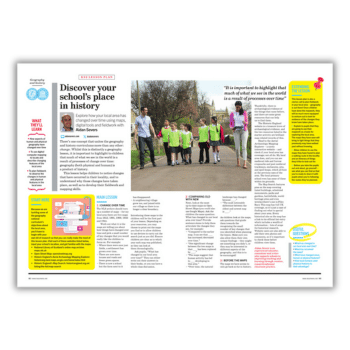Improving your subject knowledge – should primary teachers join organisations like the Historical Association?

What are subject associations and is it really worth joining? Bev Forrest sets out the benefits of these organisations…

- by Bev Forrest
- History specialist, former chair of Historical Association Primary Committee

As a subject leader in a small primary school in the 1990s, I often felt isolated and unable to find anyone to discuss how I could develop history across the school or where to find the support to improve my own subject knowledge.
When I discovered the Historical Association it opened up a new world of opportunities and I quickly became hooked.
As the years went by I became more actively involved in the association. Eventually I was elected to the primary committee and began organising CPD events in Yorkshire.
In 2019 I was proud to become chair of the committee and an honorary fellow. Not only has the Historical Association supported me professionally, but it has also become a great part of my social life – I can count many of the members as close friends.
What is a subject association?
These are membership organisations representing a curriculum area whose aim is to further teaching, learning and research in the subject. Some of the associations have charitable status and most cover all stages in education.
A major role of the associations is to provide a voice for their members at national level. They’ve been key in influencing government in areas such as inspection and curriculum reform.
Within humanities the big three are the Historical Association, the Geographical Association and the National Association of Teachers of Religious Education. Each one provides a wide range of benefits for members for an annual subscription. You can join as an individual or as a school.
Why should I join?
The Council for Subject Associations, an umbrella organisation for different groups, lists four key benefits of membership:
- To be up to date in your subject
- To be part of a subject community
- To be able to pursue your own learning
- To have access to dedicated sources of information
The range of benefits differs slightly between organisations, but they all provide support in delivering quality teaching through their resources and CPD opportunities.
The termly journals and archives of back issues are a popular benefit of membership as they are invaluable in supporting curriculum development.
The Historical Association even goes so far as offering free resourced schemes of work as part of your membership. All the organisations are a great way to find affordable or even free quality CPD, including face-to-face courses and webinars.
You may feel that at a time when there is so much information freely available on the web there is no need to pay to access these opportunities via a subject association. Robbie Russell, humanities subject leader at Raynville Primary in Leeds and a member of both the HA and GA offers a warning against this temptation:
“If we value subject specific expertise, we should turn to the experts who represent the subject associations for our information. Subject associations are an essential resource for the best of what has been thought and said in the subject that you lead.”










